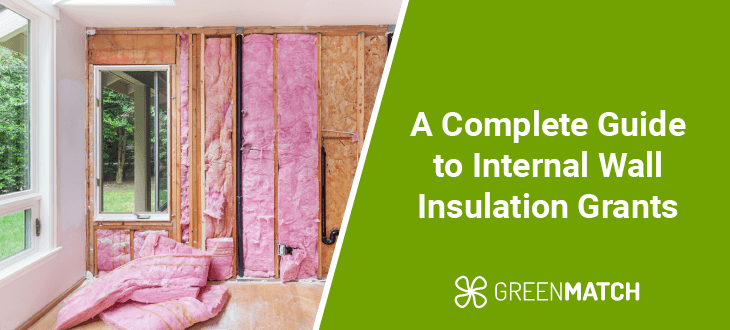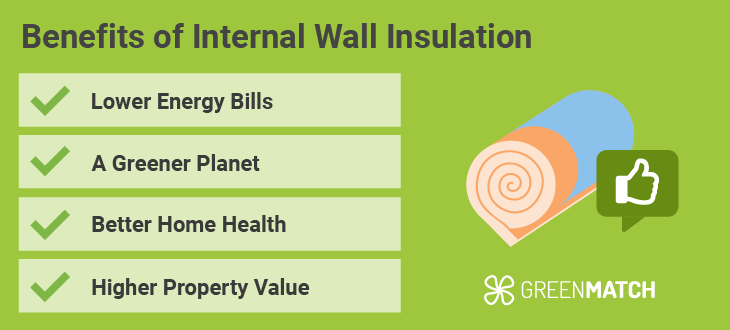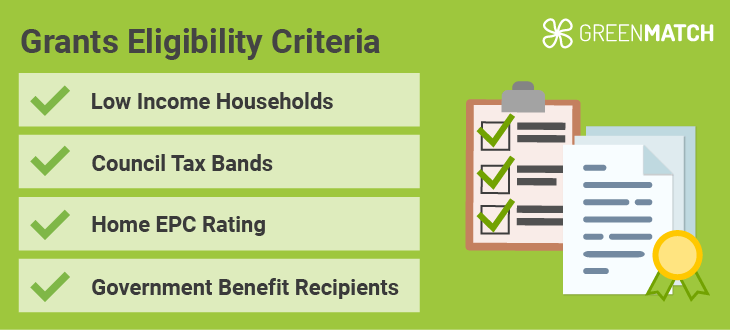Answer these simple questions and we will find you the BEST prices
Which type of solar quotes do you need?
It only takes 30 seconds
100% free with no obligation

Get Free quotes from insulation specialists near you

Save money by comparing quotes and choosing the most competitive offer

The service is 100% free and with no obligation
- GreenMatch
- Insulation
- Insulation Grants
- Wall Insulation Grants
- Internal Wall Insulation Grants
Internal Wall Insulation Grants: A UK Guide


- Internal wall insulation for a semi-detached home costs around £7,500.
- The Great British Insulation Scheme (GBIS) and Energy Company Obligation (ECO4) both provide full or partial cost coverage for internal wall insulation.
- Both government-backed grant schemes are accepting applicants until March 2026.
According to the Energy Saving Trust UK, up to one-third of all heat loss a home experiences takes place through uninsulated walls. This in turn leads to staggering energy bills, an uncomfortable living environment, and a big domestic carbon footprint. While a great home upgrade, hefty insulation prices often discourage some households from making the choice.
Luckily, the UK government has greenlighted two grant schemes to help low-income and fuel-poor houses front the bill for internal wall insulation. These two schemes are the Great British Insulation Scheme (GBIS) and the Energy Company Obligation (ECO4), both providing free and low-cost internal wall insulation solutions for qualifying households.
This ultimate guide by GreenMatch UK will give you everything you need to know about internal wall insulation grants in the UK, including who is eligible and how to apply.
Ready to insulate your internal walls already? Let GreenMatch UK be your one-stop solution for all your needs. Instead of spending countless stressful hours researching and vetting installers, spend just 30 seconds filling out our online form, and we’ll send you up to 3 free home-tailored quotes from professional installers in your area. No charges or obligations apply. Click below to begin!
Fill in the form in just 1 minute
What are internal wall insulation grants?
Internal wall insulation grants are designed to help low-income, fuel-poor, and energy-inefficient houses by providing free and low-cost internal wall insulation upgrades.
This is mainly relevant to homes that have solid walls, as homes with cavity walls should apply for cavity wall insulation grants instead. There are several different types of grants for wall insulation.
Both the Great British Insulation Scheme (GBIS) and the Energy Company Obligation (ECO4) provide free internal wall insulation throughout England, Scotland and Wales for qualifying homes.
What are the benefits of insulating your internal walls?

Like any insulation upgrade, internal wall insulation brings about a wealth of benefits to your life, from finances to your home environment, and even the planet.
Here’s a breakdown of the key perks you can expect:
- Lower energy bills: Poorly insulated homes have heating systems that are constantly overworking to top up lost heat. Internal wall insulation can reduce this problem, saving you up to £550 on annual energy bills in detached UK homes.
- A greener planet: The UK housing stock is known for its inefficiency, emitting more CO2 than all of the cars in the country combined! Internal wall insulation helps regulate your home’s inner temperature better, reducing your carbon footprint by up to 1.5 tonnes.
- Better home health: Dampness, mould growth and structural damage are all common in uninsulated homes. Other than harming your investment in the long run with hefty repair bills, the damp environment will negatively impact your health, increasing your susceptibility to respiratory illnesses and the flu.
- Higher property value: You can increase your home's Energy Performance Certificate (EPC) rating with internal wall insulation, making your home much more valuable and attractive on the housing market, should you ever plan to sell it or rent it out.
If that’s not convincing enough, the savings from internal wall insulation should do the trick. Internal wall insulation has a decent cost-to-saving ratio that helps you recoup your investment in a little over ten years. Here are some average savings per property type:
| Property type | Energy bill savings (£/year) |
|---|---|
| Apartment/Flat | £150 |
| Mid-terrace home | £185 |
| Detached bungalow | £240 |
| Semi-detached home | £315 |
| Detached home | £550 |
With all things considered, internal wall insulation emerges as an impressive home insulation upgrade, especially for solid wall properties that are looking for a long-term energy conservation solution. With one investment, you improve your savings, your living environment, and your sustainability. It’s a win-win for all!
Available grants for internal wall insulation
The two main avenues of internal wall insulation grants in the UK are provided through the Great British Insulation Scheme (GBIS) and the Energy Company Obligation (ECO4). Both schemes provide free internal wall insulation, but work slightly differently from each other:
- The Great British Insulation Scheme (GBIS) provides a single insulation upgrade per qualifying household. This upgrade is decided after a property assessment to determine the best course of action tailored to improve a home’s energy efficiency. The scheme works this way to increase its reach across the UK.
- The Energy Company Obligation (ECO4) has a more whole-house approach, in which qualifying households can benefit from a range of energy efficiency upgrades, including internal wall insulation, but also other avenues such as heating system repairs, replacements, smart controls and more.
Who is eligible for an internal wall insulation grant?

The eligibility criteria for the GBIS and ECO4 schemes are relatively the same, but they may differ slightly if you are a homeowner or a renting tenant. Government grants for landlords also have slightly differing requirements.
The main eligibility criteria focus on low-income households, homes with an Energy Performance Certificate (EPC) rating below D, and recipients of government benefits. Applicants who meet these criteria can apply for free internal wall insulation.
Low-income households
In the UK, low-income households have a gross annual income of less than £31,000 a year.
A low-income household can also be identified with its council tax band. Council tax bands are used to determine the value of your property, and how much council tax you have to pay.
Homes with council tax bands A to D in England and A to E in Scotland / Wales can qualify for grants from either the GBIS or ECO4 scheme.
EPC rating of D or below
An Energy Performance Certificate (EPC) rating tells you how energy efficient your home is and what its environmental impact is as a result. An EPC rating ranges from A (most efficient) to G (least efficient).
In terms of qualification criteria, your home’s EPC rating expectation differs if you are a homeowner or renter:
- Private home renters: EPC rating of D or E.
- Homeowners: EPC rating of D to G.
It’s a legal obligation for your home to have an EPC rating. If you don’t know yours, arrange a house inspection via the official UK government website. Many accredited insulation installers can also conduct an EPC assessment of your property as part of their installation package.
Households that receive at least one benefit
Recipients of government assistance through allowances and benefit schemes in the UK are considered able to qualify for grant schemes. The current benefits that are recognised as eligible are as follows:
- Income-based Job Seekers Allowance
- Income-related Employment and Support Allowance (ESA)
- Income Support
- Pension Credit
- Guarantee Credit
- Working Tax Credit
- Child Tax Credit
- Universal Credit
- Housing Benefit
Homeowners and tenants who are pensioners or over 70 can still get internal wall insulation if they don’t meet all of the qualification criteria. If an individual is part of the low-income group or the general group, they may still be eligible.
Low-income group:
- Homeowners and private renters with an EPC rating of E and below (renter) or D and below (homeowner).
- A resident who receives a means-tested benefit (e.g. Pension Credit Savings or Pension Credit Guarantee).
- Annual gross income below £31,000, or living in social housing and vulnerable to cold conditions.
General group:
- Homeowners in council tax bands A - D in England, or A - E in Scotland and Wales, and have an EPC rating of D or below.
You cannot apply to fund a DIY installation with a grant scheme! The job has to be carried out by a PAS 2030-2035 accredited installer. The Publicly Available Specifications (PAS) are a series of government-approved builders regulations that ensure insulation jobs are carried out to the highest standards.
How to apply for an internal wall insulation grant?

To apply for an internal wall insulation grant, you have a choice between the Great British Insulation Scheme (GBIS) and the Energy Company Obligation (ECO4). Both schemes are active until March 2026, but it’s recommended to apply earlier to secure your best chance.
The application process is relatively straightforward. Here’s what to expect:
- Check your eligibility
Once you’ve decided whether to apply for the GBIS or ECO4 scheme, use our handy guide to ensure you meet the qualification criteria. For the GBIS, the UK government portal even has a tool to help check your eligibility. This will help you save time and ensure you're applying for the right program.
- Apply for the grant
If you’re applying for the GBIS scheme, visit the official UK government website and fill out the online application form to apply. From there, you will be contacted by a representative to discuss the next steps and arrange a property inspection. If you’re applying for the ECO4 scheme, contact your energy provider directly and they will inform you of your next steps.
- Find a certified installer
To make use of any home insulation grant scheme, you’re required to work with a professional installer with the right certifications. It’s required that your installer is PAS 2030-2035 certified, as this ensures that you receive a high-quality insulation job that will last for decades to come.
- Get multiple quotes
Don't just accept the first offer that comes your way! It’s good to get quotes from several certified internal wall insulation installers so that you can get a better idea of your options.
Obtain multiple quotes to find the best deal
When choosing an installer, finding the right bargain can feel like looking for a needle in a haystack. However, properly researching and vetting is the key to landing the best deal you can. When settling for the first quote price you receive, you likely miss out on better offers.
Granted, not all of us have endless hours to sacrifice to website surfing and phone call scheduling, but that’s where GreenMatch UK comes in! We can connect you with our pre-vetted network of professional installers throughout the UK so that you can land the best bargain for you.
Simply spend 30 seconds filling out our simple online form, and receive up to 3 free home-tailored quotes from trusted professional installers at competitive prices. Click below to begin!
Fill in the form in just 1 minute
FAQ
Internal wall insulation for a typical 3-bedroom semi-detached house costs around £7,500, but this price can fluctuate depending on your home size, floorplan, and installation complexity. Your chosen insulation material will also play a role in determining your final investment.
You can get a grant for free internal wall insulation either through the Great British Insulation Scheme (GBIS) or the Energy Company Obligation (ECO4). Both schemes are active until March 2026, but it’s advised to apply earlier to maximise your chance of securing help.
If you meet the general eligibility requirements for either the GBIS or ECO4 scheme, you are entitled to a free internal wall insulation grant. The main eligibility criteria relate to low-income households, homes with an EPC rating below D, and recipients of government benefits.

Akif is a copywriter at GreenMatch since 2023. With a keen interest in community sustainability, green solutions and the role of digital media in identifying climate trends, he aims to hone in on his background in International Studies and Digital Media to provide a multidisciplinary approach to written content rooted in credible research and accuracy.
We strive to connect our customers with the right product and supplier. Would you like to be part of GreenMatch?

